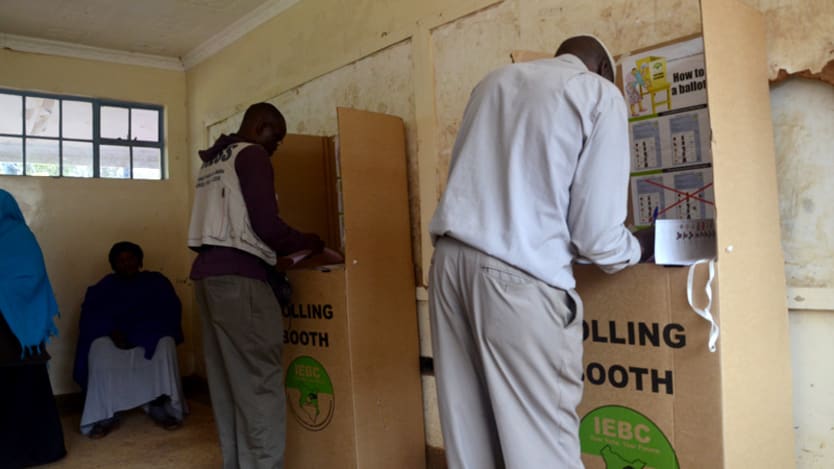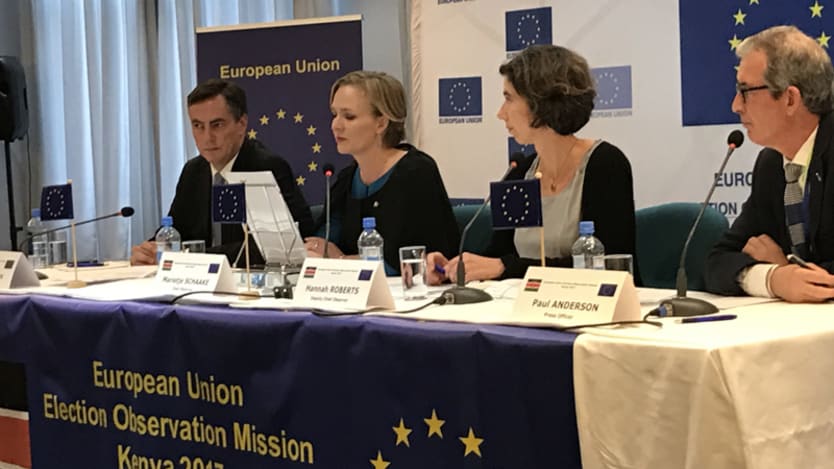
NAIROBI — Not long after the Kenyan Supreme Court nullified the country’s electoral results on Friday, opposition presidential candidate Raila Odinga faulted international observation missions. In preliminary statements, observers expressed confidence in the overall process despite some problems and urged defeated candidates to concede gracefully.
The court’s verdict, Odinga said, puts “on trial the international observers who moved fast to sanitize fraud,” alleging that international groups had favored “status quo and ‘stability’ ahead of credible elections.” Civil society organizations have echoed Odinga’s sentiments, calling the standards used by international observation missions to assess the elections weak. Some local observers had noted significant irregularities in their reports.
The perceived mismatch between the court ruling and international observers’ initial observations has sparked a debate about how such missions operate and what role they play in codifying elections. In Kenya, that discussion is complicated by a history of election violence, linked to irregularities. Clashes erupted after international observers highlighted irregularities in the 2007 election, leaving more than 1,300 dead and 600,000 displaced. Observers have since been more aware of the impact of their statements, according to Nic Cheeseman, professor of democracy and international development at the University of Birmingham.
Yet the question now is whether observers have swung too far in the other direction, holding the bar for elections too low, examining the wrong components of the process, or simply airing on the side of caution to avoid unrest. That conversation is causing some experts to ask whether election monitoring needs a rethink worldwide, particularly as electoral processes digitize.
“Fundamentally, we need to rethink the way we are doing election monitoring,” said Cheeseman. “I think there are real questions of whether we can make the international monitoring system more dynamic, more responsive, more cutting-edge and more digital.”
The results of the Aug. 8 elections, where incumbent President Uhuru Kenyatta was re-elected, were put before the Supreme Court after lawyers representing the opposition coalition filed a petition alleging results were hacked. The high court declared the elections “invalid, null and void,” and a new vote is scheduled for Oct. 17.
See related stories:
► Inside humanitarian efforts to prevent and respond to Kenya election violence
► Kenya clamps down on NGOs after election
► Kenya election: NGOs lean on local influencers to temper risk of violence
► Inside humanitarian efforts to prevent and respond to Kenya election violence
► Monitors grapple with how to measure social media's role in Kenyan election
► Q&A: Dr. Alex Awiti on how the Kenyan elections could impact development
At the heart of the court’s historic ruling were irregularities and illegalities committed by the nation’s electoral body, the Independent Electoral and Boundaries Commission, in the transmission of the results. The court has yet to release its full ruling, which is expected to include more details about what it found to be flawed.
Critics argue that international observer missions focused too heavily on the voting process, overlooking critical next steps such as the transmission of results, which in Kenya’s case was done digitally and with little transparency. The missions respond that their ability to monitor results was hampered by lack of access to the digital processes and that criticisms don’t take into account the nuances of their initial reports.
Experts say that both observation missions and electoral commissions need to work together to reform their processes to ensure greater transparency throughout the process. Logistical planning of the international missions for the October election is still underway. The Carter Center said that they are waiting for the release of the Supreme Court’s detailed judgement so that its mission can target the problems the court found.

The wrong focus?
Two days after the election, international groups, including the African Union, European Union and Carter Center, released their preliminary reports. They noted problems including election preparedness, lack of applicable campaign finance legislation, and unreliable transmission of results — but they reported no signs of centralized or localized manipulation. Observers called on defeated politicians to concede gracefully and take up any disputes of the poll results to the courts. Following these initial reports, the observers called for the electoral body to quickly finalize its public posting of the forms used in the transmission of the results.
Several days later, Kura Yangu Sauti Yangu, a coalition of civil society organizations, which served as a domestic monitoring unit, released their preliminary findings that there were “important contradictions and massive anomalies in the numbers released.” The group found a gap in valid votes of 517,555 votes.
KYSY criticized international observers after the Supreme Court’s decision, saying in a press conference Monday that, while domestic observers identified the problems with the elections, international observers were willing to accept and dismiss them. They argued that the preliminary statements were given too much weight, and were used by candidates to defend the results as credible.
The international observers focused too heavily on the actual voting, commenting on observations such as how orderly people queued on the day of polling, said Njonjo Mue, chairman of the International Commission of Jurists of Kenya, at the press conference.
“Kenyan elections are not rigged at the polling station anymore,” he said. “Elections are rigged at the point at which results are being transmitted and tallied.”
The coalition also said that the international groups used lax standards to judge that the election was credible, rather than catering their mission to Kenya’s constitution. “The Supreme Court, in its decision, appears to have placed a high premium on the entirety of the process and the legal standards ascribed to each stage rather than focus on the conduct of the polling day and the results alone,” Andrew Songa, program manager at the Kenya Human Rights Commission, wrote to Devex in an email.
Because the electoral dispute process is a critical part of a holistic electoral observation mission, observers should have held off on deeming the election credible before that process was finalized, said Songa.
Barriers to access
Observers say that they were working with less than complete information — and they noted those shortcomings in their initial reports. The population and media failed to take into account the nuance of their statements, observers say.
Marietje Schaake, chief election observer to the EU, told Devex by email that some of the current debate boils down to managing expectations.
“At times expectations of us as observers are greater than what our mandate allows us to do,” she said. “We have tried to be clear about what we can and cannot do, but one of the lessons we will draw from Kenya is to manage people’s expectations for information,” saying that future changes could include communicating more frequently on their methodology.
Kenya’s electoral process relied heavily on technology, and observers didn’t have access to the backend of the systems, Schaake said. She noted that Kenya does not have data protection laws, making it impossible to see whether the way the data was handled was in line with the law. The lack of testing the technological systems for capacity and security was a problem the EU mission pointed out in their preliminary report.
Electoral commissions also limit observer groups’ access to electronic processes and verifications, said Stephen Chan, professor of international relations at the SOAS University of London. “Both sides need a new protocol of observation and accountability.”
Observation missions could bulk out their technical staffs, even pooling resources or combining missions to ensure all monitors have enough expertise, Cheeseman said. Still, countries could also legitimately not want to give access to their servers in order to protect security, said Don Bisson, Kenya field office director for the Carter Center.
Another workaround may be timing. The international observers issued their preliminary reports on August’s election before the full extent of the problems, such as delays with transmission forms, were fully known. In the future, this could potentially be avoided by issuing initial statements that are open-ended or waiting for the process to be completed before making statements, Cheeseman said.
Kenya isn’t the only country where electronic transmission of election results has been identified as a problem. A 2009 decision by a German Constitutional Court, for example, effectively ended the use of electronic voting machines in the country, citing issues with transparency.
October’s election
The role international observers will play in October’s election is yet to be determined, and they are waiting for the release of the detailed ruling from the Supreme Court to determine what areas of the process need more scrutiny.
Over 400 observers from international observation groups were deployed for both short- and long-term observations of August’s vote. Groups such as the EU mission are now gathering feedback from Kenyans about their role in future elections.
“We are always happy to learn and reflect on our own role, in order to strengthen it going forward,” said Schaake.
Read more international development news online, and subscribe to The Development Newswire to receive the latest from the world’s leading donors and decision-makers — emailed to you free every business day.






